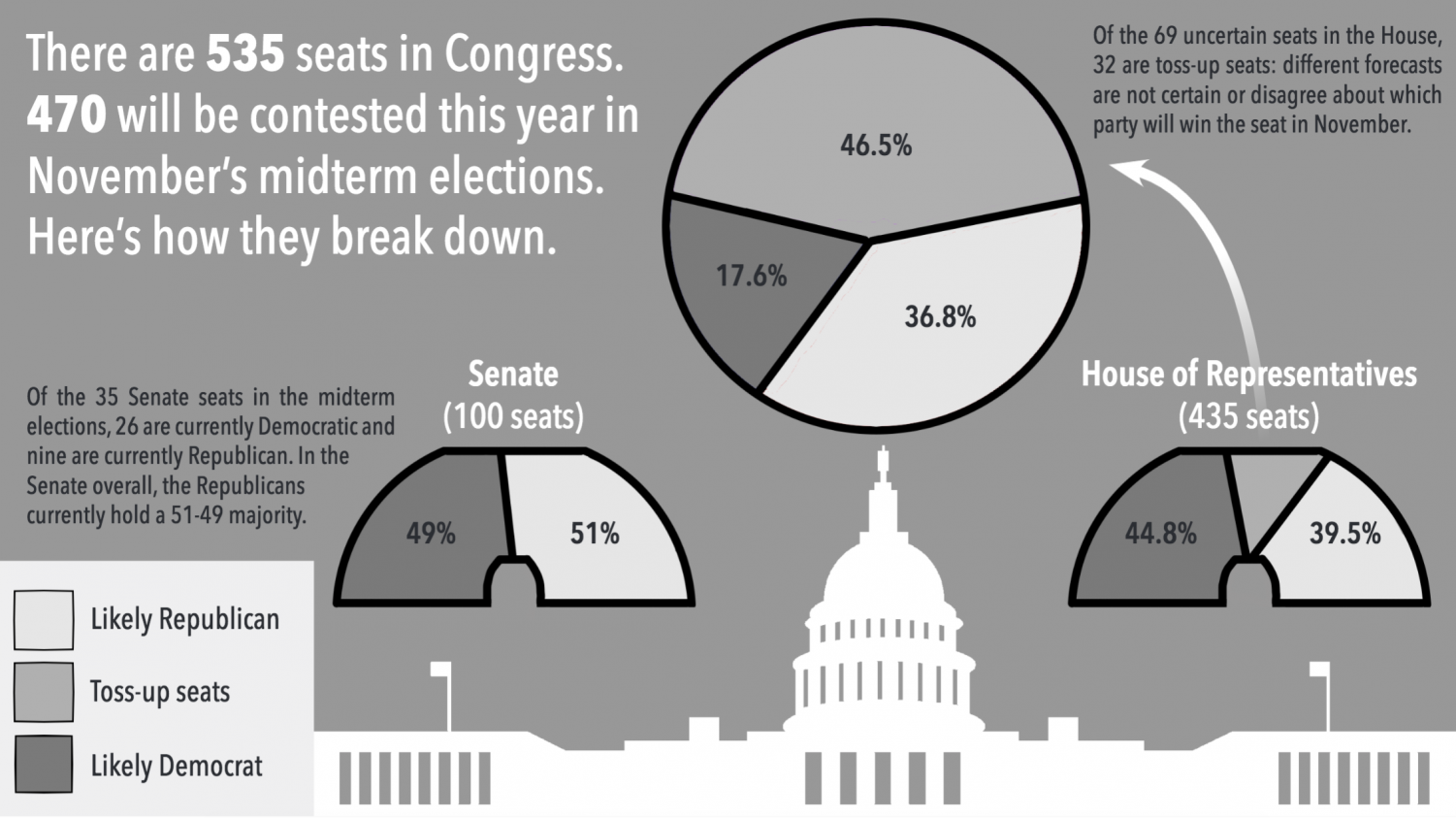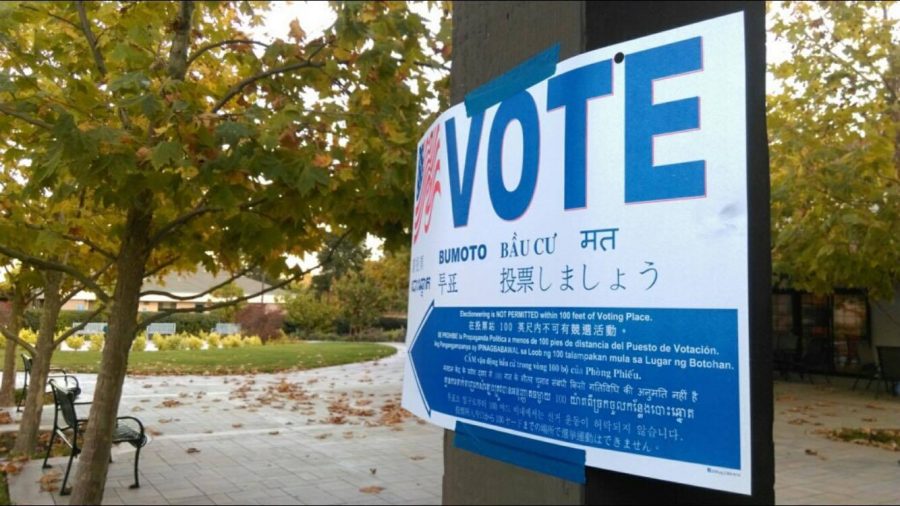Midterms bring contested races
October 17, 2018
As voting day looms around the corner, thousands of voters will be flocking to their local polling places or ballot drop-off sites to vote in the midterm elections.
Midterm elections are held every four years and usually mark the midpoint of a president’s term. In this case, it will have been two years since Donald Trump won the office of presidency back in November 2016. The midterms this year will include all 435 seats in the House of Representatives, which each have a two-year term, as well as 35 seats in the Senate, which each have a six-year term. Other positions up for grabs also include municipal roles such as mayors, council members and other local public offices.
Historically, in every midterm election since the 1860s, the president’s party has lost, on average, 32 House seats and two Senate seats in the midterm elections. Both the House and the Senate are currently dominated by the Republican Party; next month, the Democratic Party needs to win 24 seats in the House and two seats in the Senate to gain the majority in both legislative bodies.
In the latest poll administered by NBC and the Wall Street Journal, 50 percent of voters say that they would rather have a Democrat in charge, especially with almost two years of Washington being a Republican stronghold. Wins for either party would decide the result for partisan issues like abortion rights, tax reform and immigration policy in the coming years.
In the House, there are 68 competitive seats, in which it is difficult to determine which party will win. According to political forecasters, thirty-one of those seats are toss-up races, meaning that either party has a 50 percent chance of winning. States with toss-up races include Washington, California, New Mexico, Minnesota and New York. So far, 37 Republican and 18 Democrat representatives have announced that they will not be running for reelection, and open seats have a higher chance of flipping their party.
In the Senate, Republicans currently have a 51-49 majority, so Democrats need to win two more seats to reverse the majority. However, the Democratic Party will still need to maintain contested seats in West Virginia, North Dakota, Missouri, Montana, Indiana and Florida as well as historically Republican Nevada, Arizona, Tennessee and Texas.
All ten states except for Florida, Nevada and Arizona have high approval ratings for Trump, intensifying the competition between Republicans and Democrats. In Florida, with constituents still reeling over Puerto Rican relocation after Hurricane Maria and the Parkland shooting, recent polls show favor for Republican candidate Rick Scott, who attacked the National Rifle Association in support of students from Marjory Stoneman Douglas High School in Parkland, where 17 students and teachers were shot and killed in February 2018. In Nevada, Dean Heller (R) and Jacky Rosen (D) are head-to-head, but the state does have a large immigrant population, who may sway the outcome of the vote.
Jeff Flake, the senator from Arizona who was the swing vote in the Senate Judiciary Committee’s hearing on Kavanaugh, is retiring this year, leaving Republican Martha McSally and Democrat Kyrsten Sinema competing for the seat. McSally, a sexual assault victim and the first female fighter pilot in combat, is an outspoken supporter for gender rights and is a desired candidate for the Republicans.
FiveThirtyEight, a political and poll analysis website, reported that the Democratic party faces tough odds in the midterms this year compared to previous years.
This piece was originally published in the pages of The Winged Post on October 17, 2018.
New Supreme Court justice cements conservative lead
Tempered by misconduct allegations, Kavanaugh confirmation proceeds
Fred Schilling, Collection of the Supreme Court of the United States (supremecourt.gov)
The newly confirmed 114th Supreme Court Justice Brett Kavanaugh takes the Constitutional Oath, administered by Chief Justice John Roberts, accompanied by Kavanaugh’s wife, Ashley Estes Kavanaugh, and his two daughters, Liza and Margaret. The Senate confirmed Kavanaugh’s nomination in a 50-48 today.
One of the main reasons that Republicans want to secure their majority in the Senate is to support judicial decisions resulting from the nomination of Judge Brett Kavanaugh to the Supreme Court. Kavanaugh, a staunch conservative, had a far more likely chance of winning the Senate’s vote if the majority was Republican. Kavanaugh was confirmed with a vote of 50 to 48 on Oct. 6.
However, Kavanaugh’s nomination has also brought several accusations of sexual misconduct against him and a divided legislative body. On Sept. 16, Dr. Christine Blasey Ford, a psychology professor at Palo Alto University and a research psychologist at the Stanford University School of Medicine, publicly alleged that Kavanaugh had sexually assaulted her at a gathering in 1982 while they were both in high school.
In early July 2018, Dr. Ford contacted her Representative Anna Eshoo about her accusations after Kavanaugh was reported to be on Trump’s shortlist for Supreme Court nominees. Eshoo then met with California Senator Dianne Feinstein, who promised Dr. Ford that she would keep the information confidential.
After media outlets tracked down Dr. Ford’s identity, she recounted her experience to a reporter at The Washington Post, which then published an article with the accusations. Shortly after Ford came out, two other accusers, Deborah Ramirez and Julia Swetnick, also accused Kavanaugh of alleged incidents of sexual misconduct.
On Sept. 27, the Senate Judiciary Committee held a public hearing where both Dr. Ford and Kavanaugh testified. Ford alleged that Kavanaugh had “groped [her] and tried to take off [her] clothes” and she had “believed he was going to rape [her].” Later that afternoon, he testified that all sexual assault allegations were “totally false and outrageous.”
Dr. Ford’s testimony at the hearing resembled that of Anita Hill in 1991 when she accused then-Supreme Court nominee Clarence Thomas of sexual harassment. Hill experienced badgering and mistreatment from the Senate Judiciary Committee, which consisted of only white men at the time. The 11 Republicans on the current committee of 21 are all white men. Sex crimes prosecutor Rachel Mitchell asked both Dr. Ford and Kavanaugh questions on behalf of the Republicans.
In regards to Mitchell’s hiring, Judiciary Committee chairman Senator Chuck Grassley said he wished to provide “a forum to both Dr. Ford and Judge Kavanaugh on Thursday that is safe, comfortable and dignified.”
Kavanaugh’s and Dr. Ford’s testimony has created a divide in terms of voters and constituents. On Sept. 28, the Senate Judiciary Committee once again met to decide to either allow or stop Kavanaugh’s vote from reaching the Senate.
Senator Flake, the only Republican swing vote on the committee, voted in support of Kavanaugh but only after requesting that the Senate hearing be postponed by one week to give time for the FBI to conduct a background investigation on the sexual assault allegations.
On Oct. 6, the U.S. Senate confirmed Judge Brett Kavanaugh to the Supreme Court with a slim margin of 50-48. He was sworn in by Chief Justice John G. Roberts Jr. and retired Justice Anthony M. Kennedy shortly after the vote.
This piece was originally published in the pages of The Winged Post on October 17, 2018.
How to vote this Election Day
A sign near a polling location for the 2016 presidential elections bears instructions in many languages. According to the Census Bureau, 43 percent of eligible voters 18 to 29 voted that year.
If you are 16, 17 or 18 and want to vote in this year’s midterm elections or pre-register to vote in future years, here’s how.
In order to vote, you must be a U.S. citizen and at least 18 years old on Election Day. If you meet these requirements, you can register to vote in California at the website registertovote.ca.gov or fill out a paper application at a county elections office or DMV office.
To vote, go to the polling place listed on your county voter information guide between 7 a.m. and 8 p.m. on Election Day. If you arrive after the polls close at 8 p.m., you will not be allowed to vote.
In California, bringing identification such as your driver’s license, passport or county voter information guide when you vote is not required, but it is recommended if you are voting for the first time.
Once you are registered to vote, you can also apply to vote by mail and either mail your ballot to your local election official or bring it to a polling place on Election Day.
If you are 16 or 17, you can pre-register at registertovote.ca.gov, and your voter registration will become active once you turn 18. The last day to register to vote in this year’s midterms in California is next Monday, 15 days before Election Day on Nov. 6.
Helpful apps:
- Several apps provide useful information about voting.
- A link in your Snapchat user profile helps people over 18 register to vote.
- The California Secretary of State’s Vote California app displays your voter status and polling locations.
For more information, check out these resources:
VoteSure: California Secretary of State’s official list of nonpartisan election resources
Ballotpedia: Nonprofit and nonpartisan encyclopedia containing information on candidates on the ballot
Voter’s Edge California: Nonprofit and nonpartisan project between Maplight and the League of Women Voters of California with in-depth information on what’s on your ballot
This piece was originally published in the pages of Winged Post on Oct. 17, 2018.


